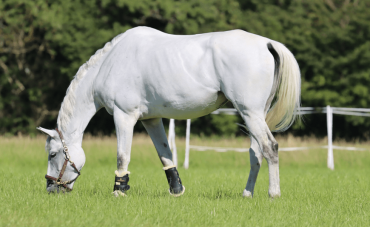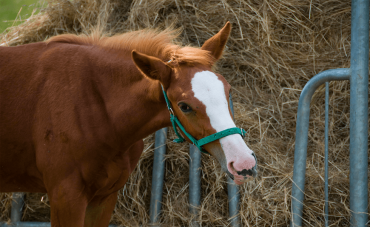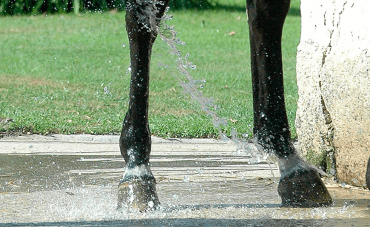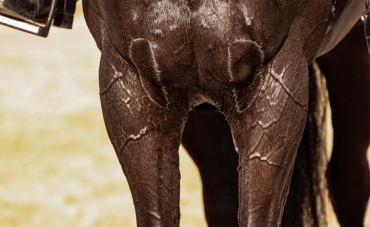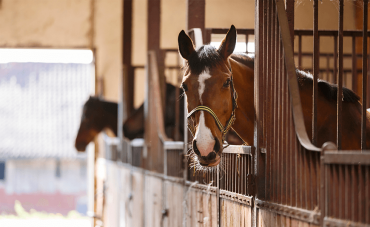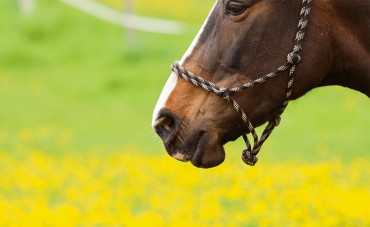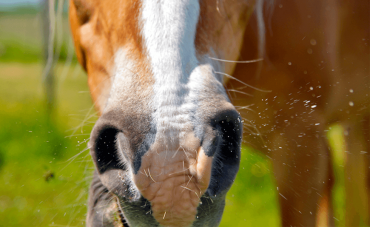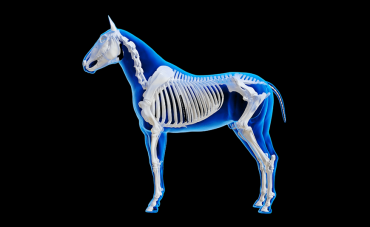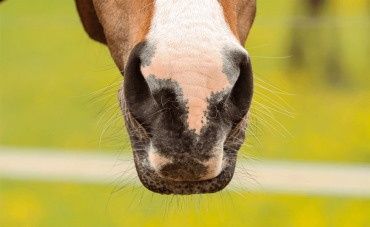Whether you are a horse owner or not, you've probably already heard of colic. This is probably because it is the number one cause of death in horses, but also the most common emergency for vets. We therefore suggest that you take a look at colic in order to understand it better, anticipate and react appropriately if your horse develops it.
What is colic?
Colic in itself is not a disease. It is actually a syndrome, a combination of different symptoms. Colic is a term used to describe abdominal pain in horses. Most of the time, these pains have a digestive origin. Non-digestive origins are much rarer and will not be discussed in this article (torsion of the uterus, bladder stones...).
What really happens in your horse's intestines?
Colic can be linked to many dysfunctions of the small or large intestine; we will discuss the main ones:
-
The blockage: it can occur in both the small and large intestine. When all goes well, the digestive content is relatively liquid in the intestines. However, sometimes this content is less liquid and cannot move forward any further. In this case, the transit will stop, and there will be an accumulation of material, which will lead to a blockage. The resulting blockage will lead to a distension of the digestive tract and therefore pain. If the horse continues to feed in spite of the blockage, the blockage will increase in size due to the arrival of new feed which accumulates on the initial blockage. The larger the plug, the more pain it will cause for the horse and will be difficult to pass through.
- Displacement: the intestine is free in the abdomen. Normally it does not move much, but it can move when overload or gas deforms it. A bit like a garden hose under pressure. In this case, the intestine can get stuck in an abnormal place which will icrease its dysfunction. The displacement may come back into place on its own, or it may require surgery.
-
Twisting: in this case, the intestine spins around completely. A bit like a garden hose under pressure, it will cause swelling upstream because food can no longer pass through. In addition to this, the twisting also causes a tourniquet effect and cuts off the blood supply to the twisted part of the intestine. This can lead to necrosis of this part of the intestine. This is an absolute emergency that requires quick surgery.
How to recognise the symptoms of colic?
Depending on your horse, but also on its tolerance to pain, the symptoms will be different. They are generally grouped by stage, which gives you an idea of the severity of your horse's colic:
-
Stage 1: No pain
-
Stage 2: Light pain
Decreased appetite
Scratching the ground
Laying down or rolling
Check its sides -
Stage 3: Moderate pain
Agitated horse
Tapping the belly with the hind legs
Lying down and rolling -
Stage 4: Severe pain
Sweating profusely
Breathing heavily
Throwing itself on the ground and rolling -
Stage 5: Severe depression
The pain is so strong that the horse hardly moves.
What to do if colic is suspected?
If your horse shows symptoms of colic, as a precautionary measure, we advise you to contact your vet as soon as possible, who will assess the urgency of the situation and give you the correct course of action.
There are some important rules if you suspect your horse has colic:
-
Remove all access to feed or use a basket if you cannot do otherwise. This will help to avoid "adding" more feed to the existing stopper.
-
Walk your horse. It is important to get your horse moving, if he can, both to try to activate the circulation in the intestine, this can possibly help to get the stopper through, but it will also keep your horse busy and prevent it from rolling around.
-
If after 30 minutes your horse still shows signs of pain, call your vet.
We would like to draw your attention to some misconceptions that may be circulating about colic:
-
Waiting: Colic can change quickly. If your horse shows signs of colic, don't wait until the next day to contact your vet. If your horse appears to be suffering, it is best to call the vet immediately. If your horse shows few signs of pain such as only a decreased appetite or if it scratches the ground a little, wait 30 minutes to see if the pain passes before calling your vet.
-
Do not put your horse in a paddock or loose riding arena. It may roll around and/or lie down, which could worsen the intestinal situation.
-
Do not give your horse any oil to help it pass. Your veterinarian can perform this procedure as he is competent to do so. If the oil is administered incorrectly, it can end up in the lungs and lead to disastrous consequences.
What treatment for colic?
If the pain doesn't subside, then the intervention of your veterinarian is necessary.
Upon arrival, the vet will start with a clinical examination of your horse. He will take a look at your horse's overall behavior and then examine the mucous membranes to check the state of hydration. He will also take the heart rate to assess the level of pain. He may also examine the abdomen to hear the sounds of digestive transit and see if it is normal, slowed down, absent, or even accelerated.
He can then perform two specific procedures in the case of colic:
-
A transrectal palpation: your veterinarian will insert his hand into the rectum to locate any abnormalities in the digestive tract: blockage, displacement, twisting. Your vet cannot feel the whole of the digestive tract because the horse's abdomen is too long. He mainly feels the colon and possibly a little bit of the small intestine.
-
A naso-gastric catheterization, when possible, can allow your veterinarian to go into the stomach by introducing a tube through the nose of your horse. This examination allows the stomach contents to be assessed and to check that a blockage in the intestine does not lead to an overflow into the stomach. This overflow is called reflux. The vet will be able to use this catheter inserted into the stomach to start the treatment, based on his examination, by administering water and paraffin oil, for example. The administration of oil is not necessarily systematic and depends on the type of colic
To relieve your horse, your vet may use anti-inflammatory drugs. They will allow your horse to relax and thus allow the stopper to move forward without pain.
As dehydration is a consequence of colic, it may happen that your vet will inject your horse with fluids. The infusion will not only rehydrate your horse but also rehydrate the digestive tract if it has a very dry stopper.
In case of doubt, he may also perform blood tests to determine the urgency of the situation and the need for an operation. Should this prove necessary, your horse will have to be taken to a clinic.
My horse had an episode of colic. Is there a risk that it will come back?
It is difficult to give an exact answer to this question. As with us, horses have different sensitivities, and certain risk factors are independent of your actions.
There are, however, "good practices" to try and limit the risk of colic for your horse.
If we look at the feed aspect, it will be essential that your horse has fodder available in large quantities and of good quality. Hay and/or grass will be the source of your horse's good digestive health. In addition to avoiding problems such as ulcers, they will also help to maintain the good intestinal health of the flora. You should also be careful about eating straw, which is not a suitable forage for your horse's diet, as it is poorly digested and can lead to the formation of blockages.
The intake of concentrate (pellets) is also important to control. If too much concentrate is fed, it can lead to acidification of the digestive tract, causing a degradation of the digestive flora. This can lead to a bad breakdown of the food and thus an increased risk of blockage in the intestine.
Water is also an essential factor. Particularly during temperature changes, some horses tend to become less hydrated, which makes it easier for corks to form.
You probably know this but horses are sensitive animals and especially sensitive to stress. Stress is a risk factor for colic. In the event of a sudden change in the daily life of your horse (transport, change of stable, competition), remember to be vigilant. These situations can lead to an imbalance of the flora; to help him, you can use pro-prebiotics such as Bo Yea Sacc Ultra to support this flora.
Follow the recommendations of your veterinarian for managing the parasitism of your horse. A worm outbreak can lead to colic.
Unfortunately, there is no miracle solution to prevent colic. With the right diet, many problems can be avoided. Nevertheless, keep an eye on your horse's behavior and at the slightest sign of discomfort, consult your vet who will be able to suggest the best possible treatment for your horse.

